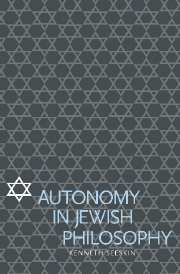Book contents
- Frontmatter
- Contents
- Preface
- Abbreviations
- 1 The problem of autonomy
- 2 Covenant and consent in the Bible
- 3 From the prophet to the sage
- 4 From the sage to the philosopher
- 5 The rise of modernity: Spinoza and Mendelssohn
- 6 The height of modernity: Kant and Cohen
- 7 Modernity under fire: Buber and Levinas
- 8 Conclusion: a partnership with God
- Bibliography
- Index
Preface
Published online by Cambridge University Press: 22 September 2009
- Frontmatter
- Contents
- Preface
- Abbreviations
- 1 The problem of autonomy
- 2 Covenant and consent in the Bible
- 3 From the prophet to the sage
- 4 From the sage to the philosopher
- 5 The rise of modernity: Spinoza and Mendelssohn
- 6 The height of modernity: Kant and Cohen
- 7 Modernity under fire: Buber and Levinas
- 8 Conclusion: a partnership with God
- Bibliography
- Index
Summary
This is a book I have wanted to write ever since I began to think about Jewish philosophy in a serious way. Where some see the essence of the religion as obedience to a commanding God, I see it differently. God does not just command. If that were all God did, we would be worshiping a dictator not a perfect being. Rather God forms a partnership with humans that requires the consent of both parties.
The standard objection to my view is that it is a transparent attempt to read the ideas of liberal democracy into the sacred literature. Needless to say, I think the objection is false. The Biblical narrative shows that humans are given more freedom in their dealings with God than philosophers of religion generally acknowledge. More important, the normal metaphor for the relation between God and humans is not the making of an edict but the joining together of two people in matrimony. I submit that what philosophers typically call “revelation” is more complicated than a list of imperatives saying “Do this” and “Don't do that.” At the very least, it is an agreement that takes into account the dignity of both parties. Without this agreement, we may have lightning, thunder, and a booming voice from the top of a mountain, but we would not have action worthy of a divine being.
As usual I wish to thank my personal “varsity” for helpful comments on every stage of this project.
- Type
- Chapter
- Information
- Autonomy in Jewish Philosophy , pp. ix - xPublisher: Cambridge University PressPrint publication year: 2001



